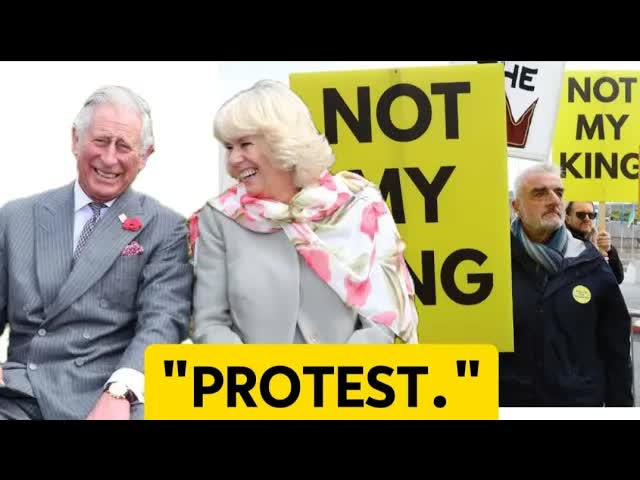In a recent visit to Scotland, King Charles III and Queen Consort Camilla were met with a cacophony of reactions that painted a vivid picture of the current state of the monarchy’s relationship with the public.
As they made their way through the streets, a mix of enthusiastic supporters waving flags and vocal detractors holding protest signs created an atmosphere charged with emotion.
This event highlighted the ongoing complexities between the British monarchy and its various nations, particularly Scotland, where historical grievances continue to fuel dissent.
The royal couple’s presence sparked a whirlwind of feelings among the crowd, revealing the deep-seated divisions within British society.
While some attendees cheered in excitement for a glimpse of the royals, others took the opportunity to express their discontent over issues like colonialism and social inequality.
The incident is emblematic of a larger conversation about the monarchy’s place in modern Britain, prompting discussions about whether this centuries-old institution can adapt to contemporary values and the evolving landscape of societal norms.
At the forefront of the protests was former MP Tommy Sheppard, a prominent Republican voice in Scottish politics.
Sheppard has long been an advocate for Scottish independence, and his impassioned speeches resonated with many who gathered to voice their opposition to the monarchy.
He represents a growing sentiment among Scots who feel that the monarchy is an outdated relic, incompatible with the principles of democracy and self-governance.
Sheppard’s presence at the protest underscored the desire for a future where Scotland could govern itself, free from the constraints of inherited privilege.
His arguments emphasize that leadership should arise from the people’s will rather than the circumstances of birth, a perspective that resonates deeply with those advocating for a more equitable society.
His commitment to this cause continues to galvanize support among those who envision a different political landscape.
Interestingly, while the monarchy still enjoys significant backing among older demographics, recent surveys indicate a gradual decline in approval, especially among younger generations.
This generational gap reveals the challenges the institution faces as it strives to remain relevant in a rapidly changing world.
Younger individuals, less bound by tradition, often view the monarchy as a symbol of a bygone era, disconnected from the realities of contemporary life.
In response to the protests, Buckingham Palace has maintained its customary silence, opting not to engage directly with criticism.
This strategy reflects a longstanding approach by the royal family to navigate controversies with dignity.
However, this reticence could alienate those who yearn for a more transparent and responsive monarchy, raising questions about the institution’s willingness to acknowledge and address public concerns.
The historical context of Scotland’s relationship with the monarchy adds further weight to the current tensions.
Centuries of conflict and rebellion have shaped a distinct Scottish identity that often clashes with the notion of a unified British crown.
The Act of Union in 1707, which merged Scotland and England into Great Britain, remains a contentious issue, fueling republican sentiments and aspirations for self-determination.
Looking ahead, the monarchy faces the challenge of reconciling its historical legacy with the values of a multicultural society.
It must find ways to bridge the divide between generations, address the concerns of marginalized voices, and articulate a vision for its future role.
This balancing act requires a commitment to both preserving traditions and embracing modern ideals of equality and inclusivity.
As the longest-serving heir apparent in British history, King Charles III is now tasked with navigating these complexities.
His reign will be characterized by the need to adapt the monarchy to the demands of the 21st century while remaining true to its roots.
Charles has often been viewed as a reform-minded leader, and his ability to balance personal convictions with the expectations of the nation will be crucial in shaping the monarchy’s future.
The monarchy’s position as the head of the Commonwealth presents additional opportunities and challenges.
While historical ties remain strong, internal pressures are mounting, with calls for republicanism and discussions surrounding the legacy of colonialism.
Charles will need to approach these issues with sensitivity, fostering unity among member states while acknowledging past injustices.
Despite the challenges it faces, the British monarchy retains a powerful allure.
Its rich history, grand traditions, and cultural significance continue to attract both domestic and international interest.
The fascination with the royal family generates considerable tourism revenue and serves as a potent symbol of British identity for many.
The mixed reception of King Charles III and Queen Consort Camilla in Scotland serves as a stark reminder that the monarchy is at a crossroads.
The cheers and jeers reflect a nation grappling with its views on the relevance of the monarchy in today’s society.
As the institution navigates the complexities of modern life, it must confront the choice between clinging to tradition or evolving to meet the demands of a changing world.
The decisions made now will shape the monarchy’s role for years to come, determining whether it can adapt and thrive in an increasingly diverse society.
